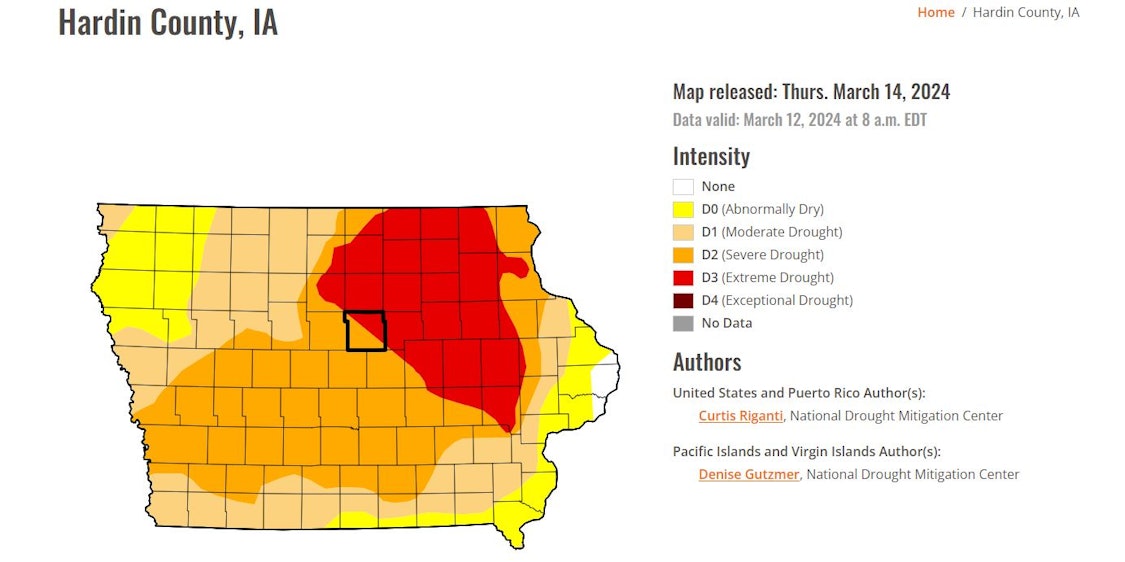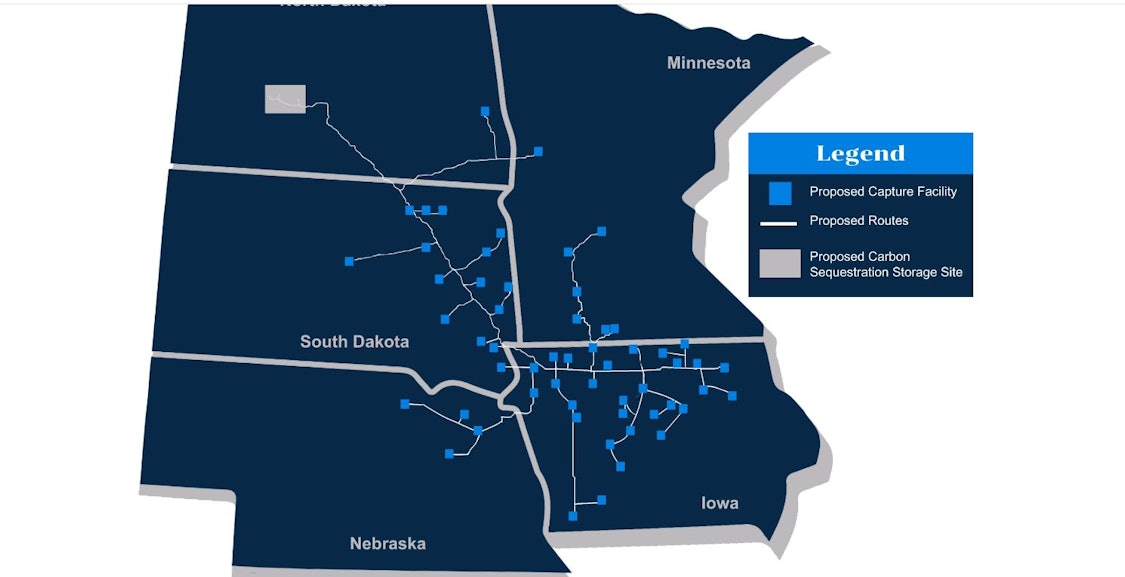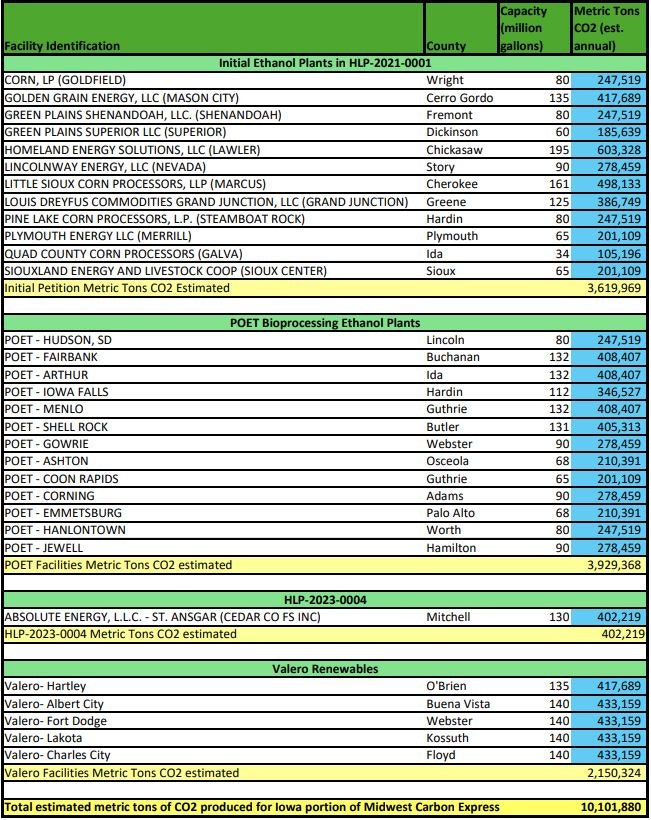The Song of King Corn, by C. A. Murch (Verses 1 and 5)
The dews of heaven,
The rains that fall,
The fatness of earth,
I claim them all.
O’er mountain and plain
My praises ring,
O’er ocean and land
I am King! I am King!
Would you dethrone me?
Not so, not so.
Still the golden tide
Shall swell and flow;
The earth yield riches,
The toilers sing,
In the golden land
Where Corn is King.
Nancy Dugan lives in Altoona, Iowa and has worked as an online editor for the past 12 years.
Disclosure: Dugan has filed several objections into the Summit Carbon Iowa Utilities Board dockets in opposition to the pipeline. Her most recent objections can be found here and here. She has neither sought nor received funding for her work.
On March 11, Kaylee Langrell, stakeholder relations manager for TurnKey Logistics, and Grant Terry, senior project manager for Summit Carbon Solutions, appeared before the Worth County Board of Supervisors to explain the newly expanded pipeline route incorporating POET and Valero ethanol plants in Iowa. Forty-six minutes into the meeting, Langrell stated the following:
You know, we were pursuing this [project] before sustainable aviation fuel was even a conversation. Now it is a conversation, and it’s a big one, because we have the opportunity with these ethanol plants being low carbon to have SAF plants come to the Midwest, specifically, come to Iowa, and, you know, create SAF with these low-carbon ethanol plants.
Langrell continued:
And so this project is one of the ways that we can get to, you know, hopefully use this opportunity. And we see it as a big opportunity, and we hope, you know, everyone else does as well. Um, and then I guess I should mention, you know, well, who’s going to buy the SAF? Well, um, that would be large, uh, airline companies. I know a couple of them have committed to switching over to SAF by, uh, 2030, 2035, so we’ve got to start making it and making it quick. And we can do that with ethanol plants in Iowa and Nebraska, South Dakota.
When asked about Langrell’s March 11 comments, Sabrina Zenor, director of stakeholder engagement and corporate communications for Summit Carbon, stated the following in a March 15 email:
Summit Carbon Solutions (SCS) is working to lower the carbon intensity of ethanol, opening up the pathway for Alcohol (ethanol) to Jet. This does not involve Summit using CO2 to make SAF. It’s about enabling Midwest produced ethanol to have access to the markets.
Exactly how ethanol plants and other potential startups in Iowa intend to manufacture SAF is not known. It is important to note that SAF paths include the production of methanol using CO2 and hydrogen, as well as other pathways, such as that introduced by Twelve, which can produce SAF using CO2 and water. As stated above, Summit Carbon’s partner plants are pursuing the alcohol (ethanol) to jet path.
According to a March 1 Progressive Farmer article, the industry is awaiting the release of a modified GREET model and associated 40B tax credit guidance from the U.S. Treasury Department that will “determine how ethanol producers will be able to claim the base credit of $1.25 per gallon of SAF produced.”
During a December 2023 BEK TV special promoting the Summit Carbon project, North Dakota Governor Doug Burgum stated the following: “Sustainable aviation fuel, if you want to call it the Saudi Arabia of sustainable aviation fuel, it’s going to happen somewhere between North Dakota and Iowa and in between, the corn belt.”
Whatever SAF production path is chosen, it appears that all involve vast quantities of water.
As previously reported, in Iowa alone, Summit Carbon created 13 separate LLCs in 2023 in its quest for water permits, although with the exception of Lawler SCS Capture, LLC, those permits have been put on hold following concerted opposition by the Sierra Club Iowa chapter and the public.
THE QUANDARY SURROUNDING ENHANCED OIL RECOVERY
One endlessly contested issue is the potential use of CO2 captured by Summit for enhanced oil recovery. “SCS only plans on permanent geologic sequestration, and does not have any plans to engage in enhanced oil recovery, nor is it exploring any such plans,” Zenor said in a March 15 email.
North Dakota officials have stated precisely the opposite in recent months.
On March 12, Summit Carbon posted the following on X/Twitter:

The text links to a March 6, 2024, Summit Carbon news release, where it’s revealed that the ellipsis in the post represents the following omitted words from a WDAY Radio Now article: “and enhanced oil recovery.”
The post was subsequently modified, adding a second ellipsis to remove the phrase “of tax revenue,” which was both redundant and slightly inconsistent with the original text.
But it is clear that the first ellipsis, representing the removal of “and enhanced oil recovery” from Burgum’s quote, strikes at the heart of the cognitive dissonance surrounding North Dakota’s proposed use of CO2 from the Summit pipeline for enhanced oil recovery and other commercial applications.
Zenor declined to comment when asked why the term “enhanced oil recovery” had been removed from Burgum’s statement.
SUMMIT FARMS SECURES THREE NEW WATER PERMITS IN HARDIN COUNTY
This month, Summit Farms Farmland, LLC secured three new water permits from the Iowa DNR’s Water Allocation Compliance and Online Permitting (WACOP) system. All are in Hardin County, which is on the path of the Summit Carbon pipeline.
Two of the three parcels are not owned by Summit.
Permit # 10510 allows for the withdrawal of 583 acre-feet of water per year at 800 gallons per minute (Mississippian aquifer; Section 21; Township T89N; Range R22W). This parcel is owned by Midwest Oilseeds, Inc., Adel, Iowa.
Permit # 10511 allows for the withdrawal of 343 acre-feet of water per year at 800 gallons per minute (Mississippian aquifer; Section 36; Township T89N; Range R21W). This parcel is owned by Fairview Farm Properties, LLC, Jacksonville, Florida.
Permit # 10512 allows for the withdrawal of 746 acre-feet of water per year at 800 gallons per minute (Mississippian aquifer; Section 19; Township T89N; Range R22W). This parcel is owned by Summit Farms Farmland, LLC, Alden, Iowa.
- 2,400 gallons per minute (800 times 3) multiplied by 1,440 (the number of minutes in a day) is equal to 3,456,000 gallons of water per day.
- 3,456,000 gallons of water per day multiplied by 365 is equal to 1,261,440,000.
These three new water permits mean that Summit Farms Farmland, LLC is capable of pumping close to 1.3 billion gallons of water per year in Hardin County alone under the permits, assuming the wells are continuously operational at full capacity. However, it is important to note that a newly obtained DNR summary report indicates the wells will only be in use from “April 1 to September 30 of each year.”
- 583 acre-feet of water per year is equal to 189,971,383 gallons.
- 343 acre-feet of water per year is equal to 111,767,040 gallons.
- 746 acre-feet of water per year is equal to 243,085,165 gallons.
A more conservative estimate based upon acre-feet per year cited in the permits is equal to 544,823,588. That figure approaches 550 million gallons of water per year in Hardin County alone under these three permits.
The Iowa Department of Natural Resources Water Use Summary Report recommended approval of the wells, stating in part: “No adverse effect upon other water users is foreseen at this time. No well interference has been noted. Following publication of notice and subject to revisions in response to comments that may be submitted, the attached draft permit should be issued for a period of ten years.”
The Iowa Geological Survey website identifies several additional Summit wells in Hardin County. The three named above are the first known wells for which Summit has sought a permit through the DNR’s WACOP permitting system. The designated use listed on all three permits is crop irrigation.
According to Wally Taylor, Legal Chair of the Sierra Club Iowa chapter, Iowa’s water permitting system is entirely too lenient. “The problem with the DNR’s interpretation of the law is that once a certain general category, e.g., crop irrigation, is deemed a beneficial use, every facility in that general category is automatically permitted. Instead of that, each facility should be evaluated on its own merits, or lack thereof.”
Pine Lake Corn Processors holds a water permit for ethanol production in Hardin County that allows it to withdraw an astounding 320 million gallons per year, at 1,070 gallons per minute, according to the DNR’s WACOP database (Mississippian aquifer; Section 03; Township T88N; Range R19W). Pine Lake is a Summit Carbon pipeline partner, but there is no evidence to indicate that the three new Summit Farms water permits are in any way tied to the facility. The new permits are, however, another immense drain on an already parched county in Iowa.
STATUS OF SENATE FILE 411
Last month, Bleeding Heartland reported on Senate File 411, which sought to amend Iowa Code chapters 331 and 364. Approved by the Iowa Senate last year, the bill would prohibit “a county or city from adopting an ordinance, motion, resolution, or amendment that limits consumer access to an energy source or that results in the de facto prohibition of the sale or production of an energy source or the related infrastructure necessary to provide consumer access to a specific energy source within the jurisdiction of the county or city.” The bill defines “energy source” as follows:
… any fuel or power source used to power an engine, including but not limited to aviation fuel, biofuel, compressed or liquefied natural gas, diesel fuel including renewable diesel and biodiesel blended fuel, electricity used for charging electric vehicles, gasoline including ethanol blended gasoline, gas distillates, hydrogen, and liquefied petroleum gas.
Under Senate File 411, both cities and counties in Iowa would be restricted in governing entities that seek to manufacture the fuels listed above. Given Langrell’s March 11 statements, it appears likely that the text of the bill is related to Summit Carbon partner ethanol plants’ plans to produce SAF in the state.
An Iowa House Commerce subcommittee voted 2-1 on March 12 to advance Senate File 411 with amendments; Republican State Representatives Charley Thomson and John Wills supported the bill, while Democratic State Representative John Forbes voted against it. However, the full Commerce Committee did not vote the bill out before the legislature’s second “funnel” deadline on March 15. So it is likely off the table this session.
According to the Hardin County assessor’s website, approximately 249 parcels in the county are affiliated with Summit in one way or another. These parcels are listed under various business names, including Summit Ag Management, LLC; Schager Holdings, Inc.; Summit Development Co., LLC; Summit Farmland IV, LLP; Summit Farms; Summit Farms Assets, LLC; Summit Farms Farmland, LLC; Summit Farms Farmland II, LLC; Summit Farms Pork, LLC; Summit Pork I, LLP; Summit Pork II, LLP; and Summit Pork IV, LLP. Below is a screenshot of Hardin County (outlined in black) from the March 14, 2024, U.S. drought monitor. Roughly half the county is in an extreme drought. The other half is in a severe drought.

FOURTEEN NEW DOCKETS ADDED ON MARCH 4
On March 4, Summit Carbon Solutions filed documents with the Iowa Utilities Board to acquire fourteen additional hazardous liquid pipeline permits in Iowa. The story, first reported on March 5 by Iowa Capital Dispatch reporter Jared Strong, chronicles Summit’s plan to more than double the number of ethanol plants along its Iowa route.

The March 4 filings were submitted by SCS Carbon Transport, LLC, a Delaware business formed on December 22, 2021. Jess Vilsack, general counsel for Summit Carbon, signed off on SCS Carbon Transport’s February 2, 2022, Iowa Secretary of State Certificate of Authority filing, listing Summit Carbon’s Ames address and identifying another LLC, Summit Carbon Project Holdco, as member manager. That LLC, also formed in Delaware on December 22, 2021, lists the same Ames address in its Iowa filing.
One of the most detailed motions following Summit’s March 4 docket filings was submitted into the original Summit Carbon docket (HLP-2021-0001) by the Iowa Farm Bureau Federation. Farm Bureau’s March 14 Motion to Reopen the Record raises numerous concerns regarding the expanded route and requests that the Iowa Utilities Board “reopen docket HLP-2021-0001 to receive evidence regarding whether and to what extent Summit’s petition must be amended to reflect and accommodate the planned expansion.”
Attachment E of the Farm Bureau’s March 14 submissions reveals a stunning statistic based upon research conducted by the Farm Bureau. With the addition of the Absolute Energy facility in St. Ansgar in June 2023, the POET facilities in January 2024, and the Valero facilities in March 2024, the amount of CO2 produced for the Iowa portion of the newly proposed Summit route rises from 3,619,969 annual metric tons to 10,101,880 annual metric tons, a nearly three-fold increase in CO2 volume.

In addition to the Farm Bureau’s filings, the Sierra Club Iowa chapter filed Motions to Reopen Record and to Consolidate or Stay Related Dockets on March 14; the Supervisors of Shelby, Kossuth, Floyd, Emmet, Dickinson, Wright, and Woodbury Counties filed a Joinder in Motion to Reopen Record and to Consolidate or Stay Related Dockets on March 14; and Jorde Landowners filed Joinders in Sierra Club and Iowa Farm Bureau Federation’s Motions and an Alternative Motion to Stay Board Decision in HLP-2021-0001 on March 15.
GEVO AND NORTHERN PLAINS NITROGEN NOT ON ROUTE
Two additional announced partnerships, one in South Dakota and one in North Dakota, also have not yet been added to the route: the proposed Gevo facility in South Dakota, and the proposed Northern Plains Nitrogen (NPN) facility in North Dakota. In the case of the latter, this addition will require a considerable northward expansion of the North Dakota route into Grand Forks County and potentially beyond.
Zenor justified Summit’s decision to omit the NPN facility from the route in a March 15 email: “SCS does not believe it’s appropriate or a good use of the ND PSC’s time and resources to apply for a permit yet to build a pipeline to NPN until more advanced stages of development.” It is not clear whether Summit Carbon consulted with the North Dakota Public Service Commission before deciding to omit this proposed facility from the route.
In November 2013, AgNews reported that NPN and “a Chinese engineering firm sat down at the state Capitol on Monday to sign a memorandum of understanding that could lead to a large fertilizer plant in the state.”
Signing the document were Darin Anderson, chairman of Northern Plains Nitrogen LLP of Grand Forks, and Wang Lvbei, vice president of China Chengda Engineering Co., Ltd.
The status of that contract is unknown.
Additionally, according to NPN’s website, one board member, CEO Clark Bailey, is linked to Eurochem, which has ties to Russia, and another board member, Retired Admiral Bill Owens, is linked to Prometheus, which is based in Beijing.
It is not known if NPN is funded in part by foreign entities. However, a statement attributed to Grand Forks city administrator Todd Feland on February 15, 2023, indicates this may be the case: “Generally the countries that move forward with fertilizer plants are centered in the Middle East…Russia…and China. It may have an impact on the NPN project.”
The proposed NPN plant will be located in close proximity to the Grand Forks Air Force Base.
Toward the end of the December 2023 BEK TV broadcast, moderator Scott Hennen asked the following of Wade Boeshans, executive vice president of Summit Carbon Solutions:
I want to just reiterate that I’ve heard from Summit officials directly that enhanced oil recovery, when the, you know, technology is ready is part of the business model, right? I mean, you’ve got a commodity here, and obviously, you’re going to – at this point, because the federal government is saying go sequestration, you’re going to start there, but enhanced oil recovery will ultimately be available from this, and Summit’s part of that, right?
Boeshans responded by stating that Summit Carbon is building a “common carrier pipeline” that will deliver CO2. “Today, we don’t have any shippers who want to ship CO2 for EOR. When that changes, we will likely move it for that purpose, because we are a common carrier pipeline providing that service.”
Bleeding Heartland asked Zenor how Summit Carbon plans to separate the CO2 designated exclusively for sequestration from the CO2 designated for enhanced oil recovery. “Our business model is for 100% sequestration, and we have no intentions of engaging in enhanced oil recovery,” Zenor reiterated on March 15.


8 Comments
thanks for fleshing out some of the many ways this can
and eventually will go wrong. Just the fact that we are planning to continue to burn crops is too much to bear.
ps love the pig-king, not a tattoo person but if I was…
dirkiniowacity Tue 19 Mar 11:09 PM
The Summit Carbon Solutions corporate motto seems to be...
“Proudly peeing on legs and claiming it’s raining since 2020.”
PrairieFan Wed 20 Mar 1:34 AM
Who will protect the public's interest?
I don’t believe Summit’s statements and denials about their true intent or who they will partner with, or their intent. We don’t know the total amount of water that will be pumped from Iowa’s aquifers or even the total amount available for pumping. These are critical issues for all Iowans but especially the agricultural industry who rely on water supply. This adds up to more demand for ethanol, corn, commercial fertilizer and more intense use of farmland. Iowa’s soil loss and soil health and loss of clean water resources are a huge risk for our state and the nation. We cannot rely on EPC or IDNR or Gov Reynolds to protect our interest or tell us the whole truth. Where are our Congress members and legislators? Aren’t they concerned?
Miketram01 Wed 20 Mar 7:20 AM
Thank you.
Many thanks for your comments. Thanks, also, to Laura Belin for her willingness to publish these stories, and for helping me behind the scenes on every piece I’ve published, including this one (I did not quite understand how the sausage is made when it came to explaining the status of Senate File 411).
Nancy Dugan Wed 20 Mar 11:51 AM
hi Nancy
this kind of activist/citizen journalism is what we will have left as advertising has moved on to bigger markets/platforms and young people don’t listen to the radio or watch linear TV so IPR and IowaPBS winding down at best, I really appreciate the sort of role-modeling you and Laura are doing here.
dirkiniowacity Wed 20 Mar 1:04 PM
Per a reference to the Iowa DNR above, I'm grateful to the DNR retiree below
What follows is from a recent CEDAR RAPIDS GAZETTE story about the severe problems at Iowa state parks and the desperate need for more repair/maintenance funding. This helps explain what it’s like to be a DNR staffer these days.
***
“My question is: What are the legislators actually being told?” asked David Downing, who served as an Iowa DNR executive officer and parks asset manager until his retirement in January. “We’re in dire straits. Everybody is afraid to talk. Nobody wants to say a word because you’ll get your head handed to you.”
PrairieFan Wed 20 Mar 2:03 PM
I'm blown away...
This has been remarkable work, Nancy. In one sense, likely to be in vain. (In halting the disastrous results to come.)
But the record will show…it was known.
Thank you.
Fly_Fly__Fly_Away Wed 20 Mar 2:29 PM
this reporter is always worth a read
https://www.reuters.com/markets/carbon/us-carbon-pipeline-company-pledges-no-oil-recovery-bakken-drillers-want-it-2024-03-11/
dirkiniowacity Sat 23 Mar 2:58 PM